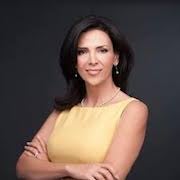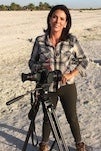
Gabriela Teissier spoke in a hoarse voice several days after reporting on more than seven extensive wildfires, the most destructive that Southern California has seen in recent history. They ravaged over more than 231,000 acres in early December 2017.
Teissier is a news and weather anchor for Univision, a Spanish-language television network. Her day starts early with coffee at 2 a.m. while reading, writing and producing news and the weather segment for a 4 a.m. national radio intervention in Buenos Dias America. At 5 a.m. her TV news show starts. Noticias 34: A Primera Hora runs until 7 a.m., and then it’s time to turn to her environmental field reports.
Teissier, an alumna of Metcalf Institute’s 2015 Change and the News Science Seminar: Planning for Rising Seas and Extreme Weather, said that what really motivates her are enterprise stories about the environment. They allow her to explain the links between climate change and natural disasters and highlight unexpected details, like the fact that Mexican agricultural laborers are among the keenest observers of changing weather patterns in the United States. Metcalf’s seminar helped her decipher these complex connections.
“My training with Metcalf empowered me to recognize the research behind scientific facts,” said Teissier. “I realize that every time I write a story about the environment, something of what I learned at Metcalf is in that piece,” she added. And it is an impressive list of stories.
This year, Nuestro Planeta won the SoCal LA Press Club Environmental Reporting Award for the third year in a row. Teissier has previously won several Emmy Awards for ‘Best multi-part Light News Story’ and ‘Best News Anchor’.
She has been interested in reporting and the environment since she was a child, both thanks to her father, Ernesto Julio Teissier, a prominent political analyst in Mexico in the 1970s.
He owned a big ranch in Coahuila, Northern Mexico, where the family spent three months every summer. “I learned a lot about nature from the ranch hands,” Teissier recalled. “I watched storms and learned about rivers. I was fascinated with the outside world.”
Even before she graduated from college, Teissier started working as a TV anchor in Mexico City. She came to the U.S. two years after completing Universidad Iberoamericana’s graphic design program. She first worked as an anchor for Telemundo before jumping over to its competitor, Univision.
A self-acknowledged “rare Latina reporting on climate change,” Teissier has been able to access interesting, underreported angles of the climate change story. For example, she makes sure to include in her stories the point of view of migrant laborers and Latino workers affected by climate change. For one particular piece, she visited a farm in America’s strawberry heartland, Ventura county.
“The mainly Mexican or Latin American labor force told me that they left farms of their own back home,” she said. “No one was working on their own land. I asked why, and they said there is no water. They have forgotten those lands because the rivers and wells had gone dry.” Her conversations with migrant laborers also pushed her to investigate the extent and effects of agricultural pesticides.
“I was surprised to hear that they had been coming to Southern California for three generations,” she said. “They know so much about the environment here. They told me about how the bees are dying. They complained about pesticides and lack of rain. They have a lot of awareness, a lot of knowledge they accumulated over the years.”
Teissier’s attempts to find Hispanic perspectives in her environment pieces also led her to file some of the first reports on the Vaquita Marina, the almost extinct smallest porpoise in the planet which lives off the coast of the Gulf of Baja, California. International efforts are focused on trying to save these endemic porpoises that drown in gillnets used in illegal fishing operations.
“Environment stories play really well on Univision,” Teissier said. “The stories bring in ratings, viewers.”
“There is this popular misconception that Latinos don’t care about the environment,” she said. “Actually, climate change is a very important topic for Latinos. Our leaders speak about it. Pew Research Center polls and government polls show Latinos are very engaged with the subject, that they are happy to make adjustments to their lives to reduce the effects of climate change.”
This is why Teissier is grateful for the tools she gained at the Metcalf Institute seminar.
“What I learned at Metcalf has permeated everywhere in our recently featured Climate Change 101 series,” she said. “It spills into all my stories.”
Read More Alumni Profiles
